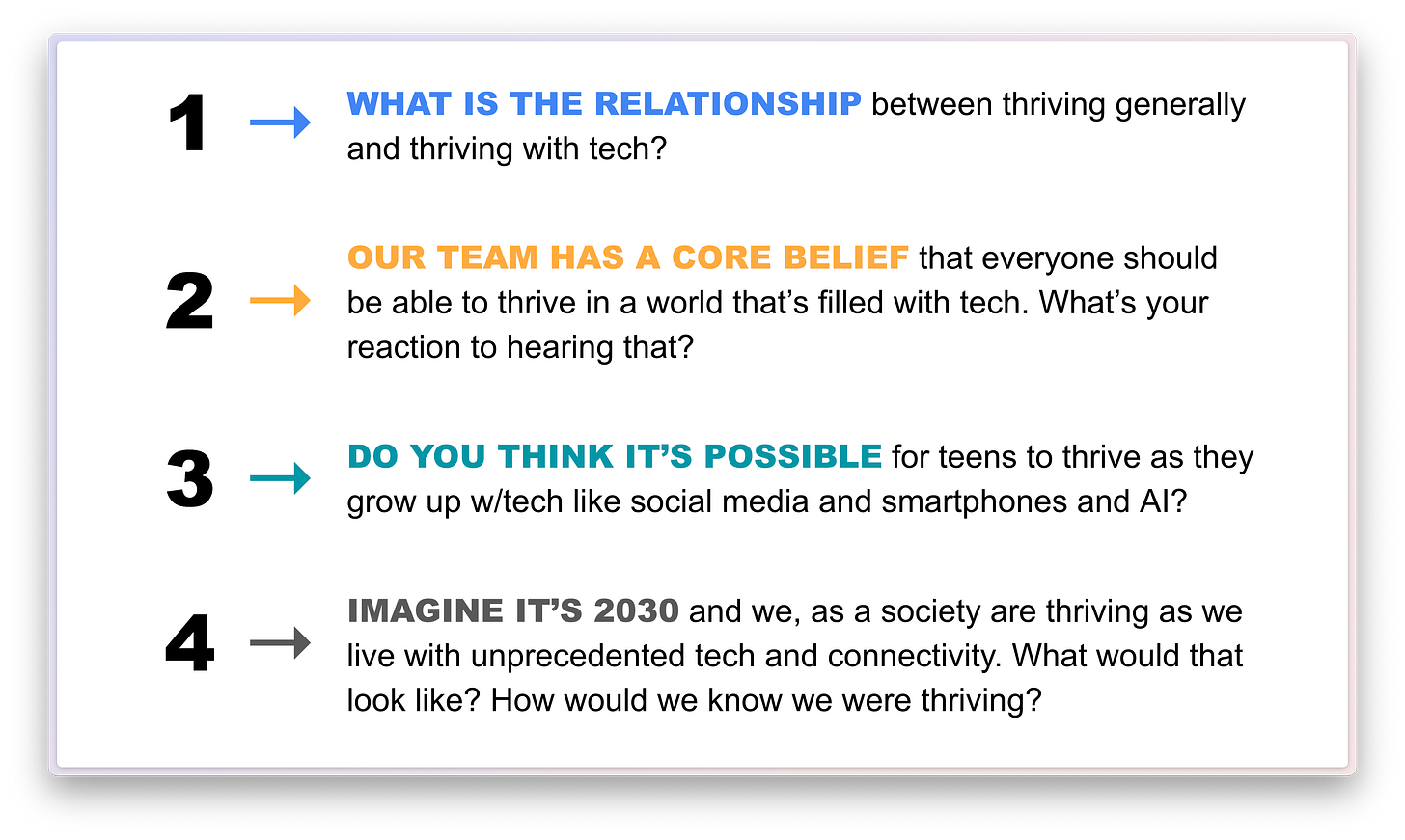Why you're getting this: You subscribed to an email list on my website or followed this Substack. You can unsubscribe at any time, and I won't be upset. I won't even know!
In this issue: I write about my experience at foo Camp, how a Clint’s Circle I hosted turned super awkward, and what I learned from it. I end with a photo of Lewis because my wife was disappointed that last week’s photo wasn’t of him.
RECAP
Last week, I attended an event called Social Science foo Camp1, which was hosted at Meta (formerly Facebook) headquarters in Menlo Park, CA. “foo Camps” are unconferences, which means that they are like a regular conference except the attendees decide the agenda once they show up.
There are foo Camps about all sorts of things, and this one was centered around social science (the study of people). There were about 300 people, and every person I met was exceedingly friendly and smart. They even had an event-wide norm to form conversation circles in the shape of Pac-Man so that there was always room for someone to join.
I knew ahead of time that I wanted to pitch a Clint's Circle listening session for the unconference schedule. In my prior unconference experiences, I had the chance to pitch my idea in front of the entire group, but there were so many people and so many slots at foo, they told folks to write their idea on a large post-it note and stick it on the schedule.
I wrote "What is Digital Thriving? Group Convo and Listening Tour" on a post-it and put it in an empty spot. Reader, this was my first mistake.
UGHHHHH
There are four, and only four, "rules" for unconferences. They are:
Whoever shows up are the right people.
Whatever happens is the only thing that could have.
Whenever it starts is the right time.
It’s over when it’s over.
People "vote with their feet," which means you don't know who is going to show up until your session begins. It also means that people can get up and leave at any time if the session isn't working for them.
Four people showed up to my session, which was smaller than I'd hoped, but also, "Rule one: whoever shows up are the right people," so... not to worry. I introduced the Center, the Listening Tour, and my hopes for the session: to go around and answer the questions below and then get their advice. I described the structure of Clint's Circle and shared the four questions:
The session started well. People seemed game and were genuine with their answers. At the same time, though, I was getting early signs that the group wasn’t completely with me. For example, people tend to be quite lengthy with their answers to the questions above, but these four individuals were rather concise. We had plenty of time at the end of the first round, so I invited folks to go around again and respond to what others had said or to answer an additional question. That round went quickly, too, and I started to worry that “What is Digital Thriving? Group Convo and Listening Tour“ wasn't what they were expecting.
FROM SHOOK TO SPOOKED
I was a bit shaken as I transitioned into the advice-giving part of the session. In reality, their critiques were thoughtful, kindly delivered, and useful.
Why are we using the term "thriving" instead of "flourishing" or "well-being?"
No, we didn’t realize that the word “thriving” doesn't translate well in Spanish.
Is “core belief” a little strong?
Could question two be leading?
Does the word "unprecedented" feel threatening?
Something in the room, and inside me, had shifted. One of my gifts as a facilitator is to create a calm, safe, and inviting space, but if my confidence starts to get shaky, as it was getting at this point in the session, I withdraw into myself and my ability to create a safe space evaporates 💨.
When someone in the group asked me to summarize the concept of “digital flourishing,” my heart dropped into my stomach. Several months ago, I’d read a paper on the concept but didn’t remember it well enough to summarize it. It was a fair question, and I should’ve had an answer to it, but I didn’t. In a painful moment that I’ve relived approximately 40 or so times since, I said that I couldn’t. I’d lost the room, or maybe it’s more accurate to say that the room had lost me.
I awkwardly wrapped up the session 10 minutes early (rule four: it’s over when it’s over) and thanked folks for their time and advice. It was the next to last session of the day, so I just left the conference and headed to the airport early.
When I got there, I ordered a cup of coffee and journaled my thoughts. On the plane, I drew an ugly picture. When I got home, I talked to people about what happened. Each of these things helped. Everyone I spoke to, especially the academics, had experienced similar moments. With each conversation, the heaviness of the experience lightened. I felt less alone, less ashamed.
RULE NUMBER TWO: WHATEVER HAPPENS IS THE ONLY THING THAT COULD HAVE.
I’ve been thinking about the second rule of an unconference, “whatever happens is the only thing that could have.” It was only four people, only an hour of my life. It shook my confidence and induced a shame spiral, but it also motivated me to have better answers to those questions in the future.
I've spent last week reading and grounding myself in the literature – what we already know, what we don't, and why we need a Listening Tour in the first place. I'm working with my colleague Eduardo to find a better word for "thriving" to use with Spanish-speaking folks, and I'm reconsidering the wording of the questions here and there. The Listening Tour will be better, and I will be a more prepared researcher because of “whatever happened” in that room.
But best of all? I’m sharing this story with you. It’s scary to admit that I messed up, but honestly? It’s scarier to hide it. In the first issue of this newsletter, I wrote, “I hope this Substack becomes a safe place for me to find my voice as a scholar and a safe place for all of us to reflect on this provocative idea — that we can thrive in a tech-filled world.”
This space won’t be safe for anyone if I can’t be vulnerable, honest, and real. We all mess up from time to time. We’ve all been in that room wishing we could get up and walk out. Hearing each others’ stories about moments like these connects and comforts us. Finding humor in our awkwardness is healing. Sharing these moments, instead of hiding them in some hidden corner of our hearts, is freeing.
See you next week, when I’ll happily summarize "digital flourishing" for you.
p.s. As always, enjoy this adorable, bored puppy, who is just happy I’m back home.
The "foo" in foo Camp stands for Friends of O'Reilly. The "O'Reilly" in Friends of O'Reilly refers to Tim O'Reilly, the head of O'Reilly Media. Tim began hosting foo Camps over 20 years ago. If you've ever been to a "BarCamp," those were invented in response to the exclusivity of foo camps, which are invite-only.










Beck, Thanks so much for sharing the FOO camp and for showing how it works and doesn't! Took me right back to a conference presentation where a woman stood up and started yelling at me that teaching stories were dangerous and had unreliable narrators. I froze, I stumbled. No one had yelled before at this conference. Like you I went back and did my homework.
I’ve been to a FOO camp… they can be intimidating. Thanks for sharing Beck